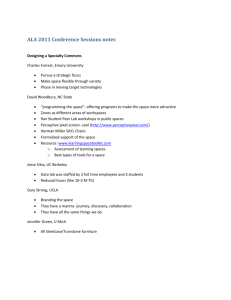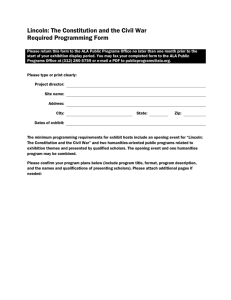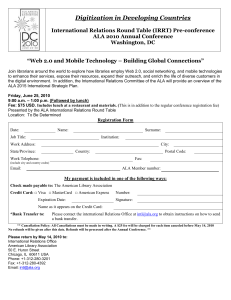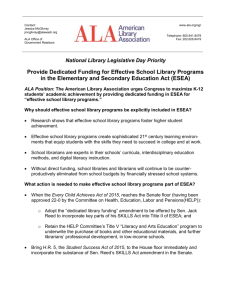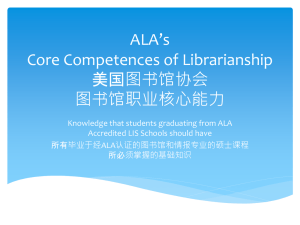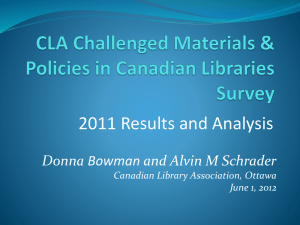Collection Development Policy 2011
advertisement
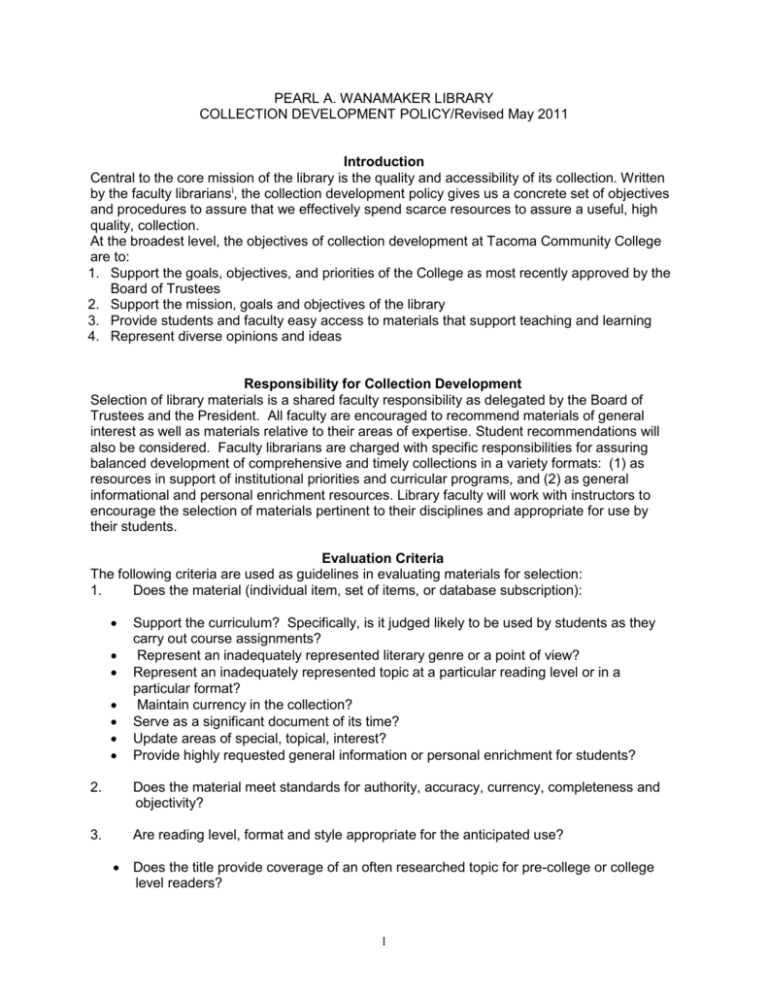
PEARL A. WANAMAKER LIBRARY COLLECTION DEVELOPMENT POLICY/Revised May 2011 Introduction Central to the core mission of the library is the quality and accessibility of its collection. Written by the faculty librariansi, the collection development policy gives us a concrete set of objectives and procedures to assure that we effectively spend scarce resources to assure a useful, high quality, collection. At the broadest level, the objectives of collection development at Tacoma Community College are to: 1. Support the goals, objectives, and priorities of the College as most recently approved by the Board of Trustees 2. Support the mission, goals and objectives of the library 3. Provide students and faculty easy access to materials that support teaching and learning 4. Represent diverse opinions and ideas Responsibility for Collection Development Selection of library materials is a shared faculty responsibility as delegated by the Board of Trustees and the President. All faculty are encouraged to recommend materials of general interest as well as materials relative to their areas of expertise. Student recommendations will also be considered. Faculty librarians are charged with specific responsibilities for assuring balanced development of comprehensive and timely collections in a variety formats: (1) as resources in support of institutional priorities and curricular programs, and (2) as general informational and personal enrichment resources. Library faculty will work with instructors to encourage the selection of materials pertinent to their disciplines and appropriate for use by their students. Evaluation Criteria The following criteria are used as guidelines in evaluating materials for selection: 1. Does the material (individual item, set of items, or database subscription): Support the curriculum? Specifically, is it judged likely to be used by students as they carry out course assignments? Represent an inadequately represented literary genre or a point of view? Represent an inadequately represented topic at a particular reading level or in a particular format? Maintain currency in the collection? Serve as a significant document of its time? Update areas of special, topical, interest? Provide highly requested general information or personal enrichment for students? 2. Does the material meet standards for authority, accuracy, currency, completeness and objectivity? 3. Are reading level, format and style appropriate for the anticipated use? Does the title provide coverage of an often researched topic for pre-college or college level readers? 1 Is the format one that can be adequately supported/accessed with College equipment or with students’ home computers? Would the title serve students more effectively if offered electronically or in print? Is the format in compliance with ADA standards? 4. Has the material appeared in one or more approved lists, been favorably reviewed in one or more recognized reviewing publications, or recommended by one or more faculty members or other professionals who are specialists in the discipline? 5. If the material is a new edition, does it represent major revision, or will the older edition suffice? 6. Should the material be purchased or can the need for it be met adequately through interlibrary loan? 7. Can the material, or a close approximation, be accessed free of charge through the Internet or as part of a larger digital collection? 8. Can the cost of this material be justified within the overall budget? Does it meet a reasonable cost per use standard? 9. If the material is included in a database will cancellation prevent future access to some or all essential content if and when the subscription is renewed? Collection Development Tools Faculty librarians consult the following tools for collection development: A Collection Conspectus is generated every three years and provides a comprehensive view of the library’s print and electronic monograph collection The Library’s ILS (Sirsi-Dynix) provides call number range and title level information for the print monograph collection Database statistics tools provided by individual database vendors, Serials Solutions, and OneSearch provide information on the use of subscription databases and the individual titles within them Assignments are noted as librarians teach one shot classes and help students at the reference desk The Library has an institutional electronic subscription to Choice. Librarians have personal subscriptions to other review publications or find reviews using the library’s data bases. Faculty input is solicited every quarter via email Faculty input solicited biennially regarding periodical subscriptions/databases The Library Advisory Committee may be consulted or asked to help solicit input regarding broad collection management issues The Library has one representative on the Curriculum Committee to identify new, modified or deleted courses that may affect collection development Librarians meet annually to identify focus areas (high circulation/old copyright date) and to assign budgets and topic areas 2 Collection Assessment Strategies This is a description of the strategies employed to assess whether the collection, as a whole, is effectively fulfilling its intended purpose. Circulation statistics for print and non-print resources—how often and when are materials used? Use statistics for databases and individual digital periodical subscriptions. Level of use, cost per use. Reference Librarian’s observations regarding the availability/accessibility of appropriate resources to fulfill student needs identified at the reference desk or in class sessions Biennial survey of faculty members. Importance of and satisfaction with subject matter coverage, quality (authority, currency), level, and availability/accessiblity of resources to fulfill student assignments Biennial survey of students. Importance of and satisfaction with subject matter coverage, quality (authority, currency), level, and availability/accessiblity of resources to fulfill student assignments Campus-wide SSI: “Library resources and services are adequate” administered every three to four years. Library may ask to add a question. Assessment of student products (as part of Program Learning Outcomes assessment) in order to determine whether: o Library owned or recommended resources are used in research assignments o Library owned or recommended resources are adequate to appropriately support research assignments Special Considerations Contemporary Literature The library will attempt to purchase titles receiving major literary recognition. This includes awards such as the National Book Awards for Poetry & Fiction, National Book Critics Circle Awards for Poetry & Fiction, New York Drama Critics Circle Award, Pulitzer Prizes for Fiction, Poetry and Drama. Local and regional writers, whose works are favorably reviewed in professional journals and which meet other selection criteria, will be represented in the library's collection. Textbooks Some heavily used and very expensive textbooks are purchased when special funds are available. Ordinarily, textbooks are not purchased unless they happen to fit other criteria listed above. Instructors are encouraged to place extra copies of textbooks on reserve for students whose financial aid is late in coming. Self-help and Laymen’s Medical Books Books on individual conditions and diseases are rarely purchased, due to the sheer number of possible titles and the lack of funds to keep such titles updated. However, general health and wellness titles, including self-help books, are purchased in support of HD and HSP courses and for students who may not be able to use a public library. Faculty counselors are consulted regarding topics of highest interest/need. 3 Test Preparation Guides The Library purchases study guides for the GED and for Washington state and national professional/technical examinations associated with the programs offered at TCC. Gifts Gifts are appreciated and encouraged with the stipulation that gifts in all formats must be subject to evaluation and disposition according to selection policies generally applicable to materials under consideration for acquisition. Gifts are accepted with the understanding that they may be discarded on the same basis and in the same manner as other materials are discarded. By law, library staff may not assign value to gifts; this must be done by the donor. The Library writes the donor a letter of acknowledgement which is dated and which itemizes the number of hardback and paperback items received. Leisure Reading Collection The Leisure Reading collection includes both fiction and non-fiction books and multi-media materials and is supported partially from donations and partially through the library’s book budget. Leisure Reading Books are not fully cataloged; they are kept in a separate location and are organized by author's last name. Many purchases are aimed at collecting appealing materials for new adult readers. Developmental Studies, Adult Basic Skills and English for Academic Purposes faculty are solicited for recommendations. Periodicals Criteria for selection of individual periodical titles and periodical databases 1. The periodical or database contents should support the curriculum 2. The individual periodicals titles (or database contents) should represent the “most requested” titles academic departments wish students to access or titles necessary to accreditation (for professional-technical programs) 3. With rare exceptions, individual periodicals should be indexed in a periodical index/database to which the library subscribes or which is freely available on the internet; otherwise, back issues are of little value 4. Periodical database interfaces must be relatively easy to use and accessible from both on and off campus 5. There must be adequate storage space if print back issues are to be retained Adding Subscriptions The person(s) making the request will be asked to confer with their colleagues and provide the librarians with a departmental/division recommendation. The librarians will gladly provide information as to current subscription costs and indexing. The intention is to control subscription expenditures while attempting to meet the changing needs of the college and its programs. Donations of periodicals Occasionally, faculty members or community residents offer to donate periodicals to the Library. These may include back issues as well as ongoing subscriptions. The Library staff always appreciates such gestures of generosity. However, at times we must turn them down. The following are some of what we must consider in determining our response to such offers: 1. Donated titles are added only if there is reasonable assurance that the source will continue to provide that title for a period judged by the librarians to be adequate. 4 (Having titles which cover short time periods are of limited use but require paperwork comparable to that of ongoing titles.) The Library accepts as needed loose copies of back issues of periodicals to which it subscribes. (We may accept more than needed but reserve the right to recycle what we cannot use.) Replacement Materials Replacement of stolen, lost, damaged, and unreturned material is not made if comparable material, particularly more recent material, is adequately available to meet needs. If the need for a particular item is critical, it is replaced at once, funds permitting; otherwise a waiting period of at least one year is observed in order to allow time for possible return or location of missing items. Paperbacks To keep costs down, paperbacks rather than hard bound volumes are generally purchased when available. Reinforced covers, at a small additional prince, will be ordered as judged necessary. Exceptions are items judged to be heavily used, especially certain reference items. Foreign Language Materials Acquisition of foreign language materials is generally limited to dictionaries and other general reference tools. Other pertinent materials in foreign languages are represented in English language translations. Advanced Research Materials In general, materials suitable for advanced levels of research are acquired only as needed for institutional purposes. Except as they can be served through interlibrary loan, faculty members and others pursuing graduate studies or otherwise engaged in non-institutional research projects are referred to university libraries for such materials. Weeding and Discarding Weeding of materials is recognized as essential to maintaining a balanced collection of materials in all formats. Incidental weeding to eliminate obsolete, worn out, or irreparably damaged materials is a continuous process. Systematic collection analysis to eliminate materials for lack of value or use is a shared responsibility among librarians, who consult with faculty members as necessary. The Conspectus report is run once every three years for useful statistical data regarding the age and use of the collection. All materials withdrawn from collections are first officially declared discarded and then are disposed of by legally prescribed means. Re-evaluation of Materials Because evaluation for selection involves subjective judgment, opinions may differ as to the usefulness and merits of materials acquired. Any student, faculty member, staff member, or adult citizen of the community who seriously questions the inclusion of a particular item in the print or non print collection may call for a re-evaluation of that item. The following procedures are established to provide a systematic and objective re-evaluation process: 1. Each request for re-evaluation shall be presented, in writing, to the Library Director. 2. Each written request shall be made by filling out, as completely as possible, the Request for Re-evaluation of Material form for each title in question, with specific objections cited. 3. Each request for Re-evaluation of Material shall be signed and identification of the initiator shall be supplied so that proper reply can be made. 5 4. Within two weeks of receipt of a Request for Re-evaluation of Material, the Library Director or the Library Faculty Chair, as his/her designee, shall appoint a committee to review the item in question and make recommendations concerning its disposition. 5. The committee shall consist of one instructor representing a discipline to which the material in question is related and one faculty librarian. 6. Within fifteen (15) days of appointment the committee shall have reviewed the material in relation to the selection policy defined herein and shall report its conclusions, including recommended dispensation of the material, in writing to the Library Director. 7. Within one week of receipt of the committee's report, the Library Director shall submit it to the College President with his/her endorsement or an alternative recommendation. 8. The initiator of the request for re-evaluation shall be notified in writing of the action taken by the President. 9. The decision of the President shall be implemented immediately by the Library Director, the questioned material remaining in the collection pending that decision. 6 REQUEST FOR RE-EVALUATION OF MATERIAL IN TCC LIBRARY COLLECTIONS (Use separate form for each item) Initiated by (your name) Telephone ________ Email Address ________________________ Mailing Address ____________________________________ Representing: self group (name of group or organization) Identify material questioned: Please respond to the following questions: (If sufficient space is not provided, please use additional sheet of paper.) 1. Have you seen or read this material in its entirety? 2. To what do you object? Please cite specific passages, pages, etc. 3. What do you believe is the main idea or intended purpose of this material? 4. What do you feel might result from use of this material? 5. What reviews of this material have you read? 6. What action do you recommend that the College take on this material? 7. In its place, what material on this subject do you recommend that would serve the same purpose? Date________________ Signature____________________________________ 7 i The following resources were consulted in the creation of this document: American College and Research Library (ACRL). (2004). Standards for Libraries in Higher Education http://www.ala.org/ala/mgrps/divs/acrl/standards/standardslibraries.cfm ACRL. (2006). Guidelines for Media Resources in Academic Libraries. http://www.ala.org/ala/mgrps/divs/acrl/standards/mediaresources.cfm ACRL (2008). Guidelines for Distance Learning Library Services http://www.ala.org/ala/mgrps/divs/acrl/standards/guidelinesdistancelearning.cfm#resources American Library Association. (reaffirmed 1996). Library Bill of Rights http://www.ala.org/ala/issuesadvocacy/intfreedom/librarybill/index.cfm American Library Association. (1990). Challenged Materials: An Interpretation of the Library Bill of Rights http://www.ala.org/Template.cfm?Section=interpretations&Template=/ContentManagement/ContentDispla y.cfm&ContentID=31881 American Library Association. (updated 2004). Freedom to Read Statement. http://www.ala.org/ala/aboutala/offices/oif/statementspols/ftrstatement/freedomreadstatement.cfm 8
